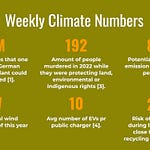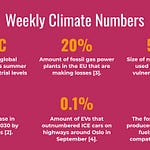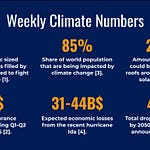Welcome to this weeks edition of The Weekly Climate 🎉
Refterences: [1], [2], [3], [4], [5] and [6].
‼️News you can’t miss
Here’s one important scary/bad (🙀), good (😻), interesting (😼) and fossil (💩) news item.
🙀 EU decided to include fossil gas as fundable clean energy.
😻 Big win for activism this week in Germany as the government is being ordered to do more to ensure the future of future generations.
😼 We The Power shortfilm released by Patagonia detailing the benefits of community owned energy.
💩 Shell is fooling us.. again..
👩⚕️ Status: Climate & Science
Let’s look at how we’re doing this week!
[#glaciers] — A new study reveals that meltwater from glaciers over the past two decades are responsible for 21% of sea level rise. I’m curious what the remaining 79% comes from. This is likely getting worse as a new comprehensive study published last week uses recently declassified satellite images to determine that glaciers are melting faster than ever. Glaciers today are melting 31% faster than they did 15 years ago.
[#tippingpoints] — Grist made a short video about climate tipping points and a more in-depth article go to along with it. From permafrost to ocean currents and ice albedo. It’s interesting if you haven’t heard about these before.
[#netzero] — When we reach net-zero emissions will global warming stop? I must admit that I thought that it wouldn’t — that we had “locked-in” further global warming due to delays in the way the climate responds to emissions. But a new study makes it clear that when we reach net-zero global warming should stop. However, with the usual caveats and uncertainties and the big question as to whether it can be achieved at all and in time.
[#earth] — Last week I posted a story about how climate change is changing the axis of the Earth and asked the question: I wonder what this means. And here’s the answer. This problem alone will cost 27T$ every year according to one insurance company. So there’s that.
📰 The 7 Grand Challenges
⚡️Decarbonize Electricity
Clean electricity is the one do-or-die challenge we must solve.
[#wind] — A new report calculates the exact carbon footprint of windpower. On average it’s around 11 g / KWh of CO2 emissions. But that number depends on the size of the wind turbine. A giant wind turbine such as GEs new 14MW monster goes as low as 6g/KWh. These numbers make wind power the lowest of the clean electricity portfolio, second only to nuclear which comes in at 9 g/KWh. Furthermore, developments within cleaning steel production could reduce those numbers even further.
[#wind] — A few weeks ago I posted an article here about a design for vertical wind turbines. Now a team of researchers have done the math and concludes that these vertical wind turbines might be more efficient than the classic propeller based ones. The reason is that the propeller ones creates more turbulence which is detrimental to the efficiency of wind turbines that is not in the front row.
[#denmark] — Denmark is being used as a case study and promoted by Inside Climate News for our plans to build a wind island - yes, an island that generates 10GW of electricity. And sure, we’ve done some great things in the past but let’s not forget that our current government was elected on a climate mandate and so far have been mostly approving gas pipelines and this wind island.
🏘 Reduce impact of urban and rural areas
Lowering the impact of urban and rural areas.
[#ev] — Lawmakers in New York passed a law last week which requires all vehicle sales to be zero emissions by 2035.
[#plastic] — As you know if you’ve read previous newsletters, plastic recycling is largely not happening, because it’s too expensive. But that is changing right now in the US as scrap prices have falled over 60% over the past two years. This price drop makes plastic recycling more affordable and competitive. Certainly a good development, but let’s not increase our plastic usage just because of that.
🛁 Clean non-electrifiable activities
Some activities we do today can’t be electrified, these must be cleaned some other way.
[#industry] — This weeks 🎧 Interchange podcast dives into how to decarbonize heavy industries. It looks at the current hot technologies and where to go from here.
[#hydrogen] — This article by Inside Climate News dives into hydrogen as a future clean fuel for shipping. But it has plenty of problems. Hydrogen’s energy density is much lower than the heavy fuels used today and current storage means keeping it in big tanks that needs to cool the fuel down to -253C rendering it not a fit for cargo ships.
[#aviation] — Sustainable jet fuels (SAF) currently are between 2.5 and 8 times more expensive than their fossil fuel counterparts. Currently, only SAF are the near-term alternative to long distance hauls. What we can change about this is the price of carbon. And the carbon price needs to be about 252$ pr ton for SAF to compete.
🌳 Protect and grow nature
Nature is our ally, we must protect it and help it help us.
[#rainforest] — 4 months into 2021 and the Amazon has already lost about 30 times the area of Manhattan to deforestation. This is very bad although a new study in Nature reveals that contrary what probably most people think, it’s not deforestation that is driving carbon emissions from the rainforest, but rather forest degradation. Forest degradation releases 3x more carbon than deforestation.
[#death] — Human composting may soon be legal in Colorado. The governor is looking at making it legal for people to decide that they want to be turned into compost when they die. A company (Recompose, which we have mentioned before) have developed a way to do this.
[#offsets] — The Californian carbon offset program has been caught in a pretty gross overestimation of their offset assets. An NGO specializing in evaluating carbon offset programs have determined that as much as 30% (or almost 400M$) of the carbon offsets sold by the carbon offset program shouldn’t have been issued.
🍽 Optimize food
Without the lower impact of food or drink the hero doesn’t work (modified old danish proverb).
[#cows] — We’ve all read the stories about how seaweed can reduce methane emissions from cows almost completely. However, at this point most of these new types of feed are still very far from the scale that they need to. This article on Earther looks into what else cows are eating that might help. Turns out that cows stomachs are excellent for getting rid of all kinds of things and they’re not very picky either with what they eat. A completely different way to go is to simply stop eating beef. The food website Epicurious just made their move this week deciding not to publish any future recipes with beef.
[#robots] — Cleantechnica looks at new technology for helping farmers control weed without the use of chemicals. A duo of two robots (Tom and Dick) and a cloud platform (Wilma) gets the job done.
[#geothermal] — A 90-year old Nebraskan farmer is growing citrus fruits sustainably all year round thanks to geothermal and now he’s helping other farmers doing the same.
[#foodwaste] — Who would have thought that I would have two news items from Nebraska in one newsletter, but here you have it. University of Nebraska is using a mechanical stomach to digest food waste hereby eliminating about 95 tons of CO2 emissions from the food waste the university generates every year. This seems really neat, although the energy used to produce the food is still wasted...
⚖️ Climate Justice
Without justice there’s no future.
[#banks] — A large group of NGOs wrote a letter to US banks urging them not to fund the chemical plant in Louisiana’s “Cancer Alley” (we’ve mentioned this plant multiple times in the past). It’s being called a clear case of environmental racism.
📦 Other / catch-all
All the other stuff that I couldn’t fit into any of the other categories, than the other category.
[#shortfilm] — Patagonia published a short film (38 minutes) that highlights all the amazing benefits of community-owned energy. It’s well worth a watch!
[#music] — As it looks like COVID lockdown measures across the world will soon start to be lifted the music industry is increasing the push on doing things differently this time around by urging musicians across the world to reconsider flying as well as donating a percentage of their revenue to climate friendly projects especially one’s focussing on the music industry such as A Greener Festival, Music Declares Emergency and Julie’s bicycle. This is cool because it gives you a direct way to help by listening to artists who supports this (which I’m sure they will publish soon).
[#climaterisk] — How does one calculate risks from multiple interacting climate change scenarios? This guest post on CarbonBrief dives deep.
[#book] — If you haven’t read Michael Mann’s new book “The New Climate War” you’re missing out but this article in Cleantechnica examines some of the key points of it.
⭐️Special Topics
🎩 Global and local policy
We have a special interest in covering the major global and local policies regarding climate, whether good or bad.
[#activism] — Montana is about to become the most dangerous place in the world to have a climate protest as legislators are about to pass a law that can give protesters upto 150.000 USD in fine and 30 years in prison. Insane.
[#california] — The governor of California (home to the third largest oil production in the US) issued an executive order which means that the state should start drafting a complete ban of fracking by 2024 and ending oil extraction by 2045. More of that, but faster please.
[#germany] — A few months ago France’s government got ordered by it’s court system to act on climate and this week Germany’s High Court orders Germany’s government to do the same. The basic ruling was that Germany’s government need to update a 2019 law with more ambitious targets to ensure that future generations are protected.
[#billgates] — Bill Gates was invited to speak at the Leaders on Climate Change hosted by President Biden. And well. You can read his speech here. And then Michael Mann who’s not exactly thrilled about it. Bill Gates speech is very technology focused as you would expect and here The Verge dives into all the lovely hockeystick technologies (and some real ones) that were presented at the summit.
[#eu] — Remember last week when I was happy that the EU Parliament decided to include nuclear in the group of technologies that they fund? Well now they decided to include fossil gas too 😫.
[#greenwashing] — An alliance led by UK and Canada to end coal power plants called “Powering Past Coal” is being called pure greenwashing by an expert NGO in the space. But it doesn’t actually take an expert to see this is true as many of the members of this “alliance” are still producing coal power plants.
[#beefpolicy] — Lots about cow-products this week. But this one from a political angle. There’s been a lot of US conservative propaganda this week about how Biden will ban cow meat. This article in Heated looks at that as well as how the meat industry is actively working against climate policy to regulate it.
⛽️Major Carbon Emitters
We have a special interest in covering the moving of the major carbon emitters as these are the key roadblock to climate action.
[#banks] — A new study shows that banks emit 700 times (total: 1.04 Gt CO2) more emissions from their financial activities than from their offices. But these numbers should be taken with a cliff sized grain of salt. Because only 25% of the banks studied actually reported financial emissions and of those 25% only half of their portfolios were reported. But its good to know that banks world wide are at least responsible for 3% of the worlds global emissions.
[#shell] — Ketan Joshi dives into Shells many attempts at “making a climate plan” which is little more than shuffling of numbers with plenty of wiggle room to not really keep to those numbers. It’s disgusting and they’re very good at it.
[#orphanedwells] — This Desmog article looks at the growing problem with orphaned oil wells in the US. Here they look at Louisiana. A guy with his own plane has taken matters into his own hands and are documenting the orphaned wells from above. (An orphaned oil well is an oil well for which the owner is not known or bankrupt).
[#canada] — This is ridiculous. Developers of a Canadian oil sands pipeline have won the ability to keep their insurers names secret because “insurers could reasonably be expected to prejudice its competitive position in its dealing with potential insurers”. The good news is that it would appear that funding and insuring fossil fuel infrastructure is fast becoming a tabu and something good banks and insurance companies just doesn’t do.
[#bitcoin] — In case you hadn’t had enough here’s another article on why bitcoin is bad for the environment by the New Yorker’s Elizabeth Kolbert. Please don’t equate bitcoin with blockchain though. There are blockchains out there that uses less wasteful mechanisms.
That’s it for this week folks! Remember if you’re feeling down, angry or sad from some of the news in this newsletter one cure is to act. And one way you can always act that also happens to be one of the most powerful things you can do is to talk about it. That also works if what you just read made you hopeful or happy btw.
If you enjoyed this newsletter don’t forget to share it with your friends, coworkers or other people you think could benefit from getting it. If you got directed here by a friend or another link on the Internet don’t forget to subscribe!
See you all next week 👋












